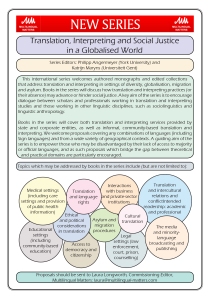We are very happy to introduce this new book series on Translation, Interpreting and Social Justice in a Globalised World edited by Philipp Angermeyer and Katrijn Maryns. In this post, the series editors introduce their series and explain what topics it will cover.

In our era of globalisation and migration, translation and interpreting are ubiquitous phenomena wherever speakers of different languages come into contact, and are inextricably linked to questions of social power and inequality. In contexts as varied as courts, schools, hospitals and workplaces, or in interactions with police or refugee services, translators and interpreters variously take on roles as institutional gatekeepers, intercultural mediators, or advocates for members of marginalised communities, with evident implications for the encounters and the participants whose communication is thus mediated.
This international series welcomes authored monographs and edited collections that address translation and interpreting in settings of diversity, globalisation, migration and asylum. Books in the series will discuss how translation and interpreting practices (or their absence) may advance or hinder social justice. A key aim of the series is to encourage dialogue between scholars and professionals working in translation and interpreting studies and those working in sociolinguistics, linguistic anthropology, or other fields related to linguistics.
Books in the series will cover both translation and interpreting services provided by state and corporate entities, as well as informal, community-based translation and interpreting. We welcome proposals covering any combination of languages (including Sign languages) and from a wide variety of geographical contexts. A guiding aim of the series is to empower those who may be disadvantaged by their lack of access to majority or official languages. Proposals which bridge the gap between theoretical and practical domains are particularly encouraged.
Topics which may be addressed by books in the series include (but are not limited to):
- Translation and language rights
- Access to democracy and citizenship
- Asylum and migration procedures
- The media and minority-language broadcasting and publishing
- Educational settings (including community-based education)
- Medical settings (including care settings and provision of public health information)
- Legal settings (law enforcement, court, prison, counselling)
- Cultural translation
- Interactions with business and private-sector institutions
- Translation and intercultural relations and conflict
- Ethical and political considerations in translation
We welcome proposals on research that contributes to these themes. Proposals should be sent to Laura Longworth, Commissioning Editor. For more information about the new series please see our website or download a flyer for the series here.